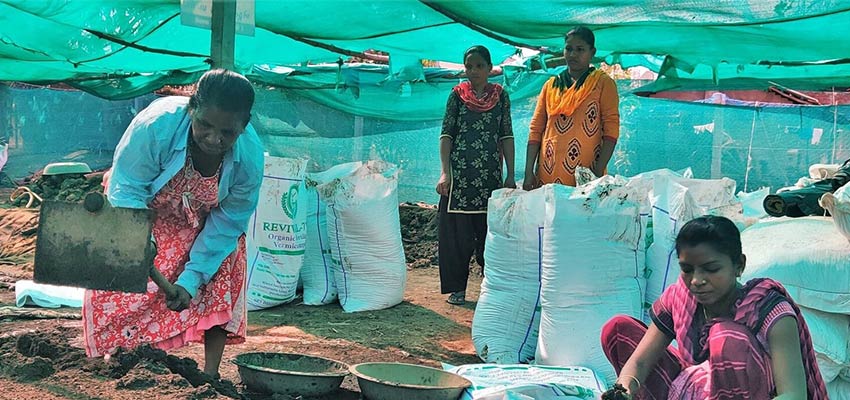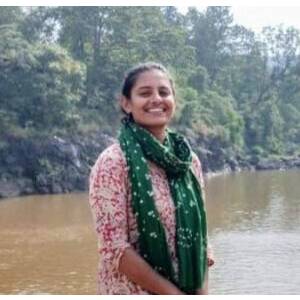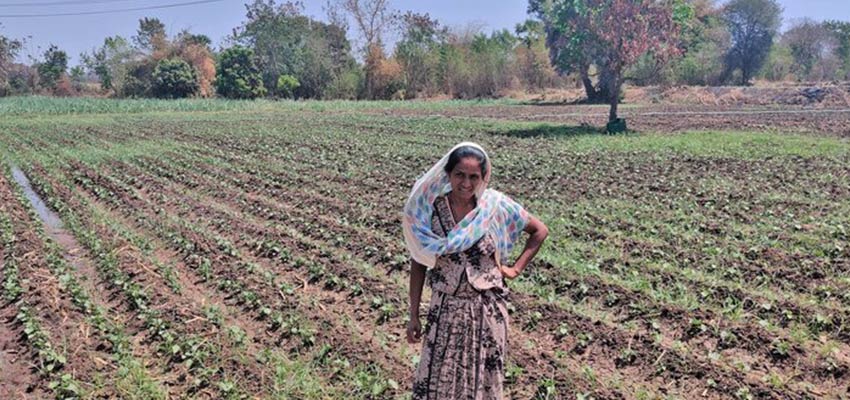
Original blog post on Upaya Social Ventures website.
Namrata Acharya is a 2021 Scale-Ups Accelerator Fellow. The Scale-Ups Accelerator is an initiative created by Upaya Social Ventures and MIT D-Lab to increase capital flows to women entrepreneurs in India.
Namrata Acharya never imagined she would become an entrepreneur. But, after learning about the struggles faced by farmers and rural villagers who rely on agriculture for their livelihood, Namrata knew she wanted to do something about it.

Samriddhi. Photo credit: Courtesy Upaya Social Ventures.
She and her business partner, Ankur Chaudhari, identified a business opportunity in vermicomposting, the process of using earthworms to convert organic waste into compost for organic farming. They hypothesized that, by enabling farmers to transition to organic farming using vermicompost, they could increase the farmers’ incomes while also creating employment opportunities for rural villagers by setting up local vermicomposting units.
Namrata is one of the nine women participating in the 2021 Scale-Ups Accelerator, a collaboration between Upaya and MIT D-Lab to tackle the barriers women entrepreneurs face in fundraising and help get their businesses ready for investment. She shared many learnings and anecdotes from her entrepreneurial journey so far during a candid conversation with Upaya’s accelerator manager, Rachna Chandrashekhar.
Read the interview below to learn about the women Namrata’s company employs and the trials and tribulations she has already overcome as a woman business leader.
Did you always know you would become an entrepreneur?
From the time I grew up, and while growing up during college, I never imagined that I would ever start a business. During my MPhil, I got an opportunity to live and do action research in a rural community. So I lived with a community in a village in Jharkhand. There, while I was working on some other problem, I realized that agriculture—which is the core of the economy, and the core of our being actually—is not doing well. Our agriculturalists are struggling to make ends meet. When that realization came to me, I wanted to do something about it. And this business came to be the means of achieving that end.
What inspired you to start your own business?
Agriculture is basically a very precarious kind of business. And I want to really find a way to reform it—to do something to address that issue. So, after my MPhil, I briefly joined the development sector. I thought that this was the easiest way to live and work in a village—through an organization. But I realized that, in an organization, especially a very big or very old organization, you need to work within systems, and that gives very little freedom for your creativity or ideas. So then I realized that, if I really want to be creative—really want to make an impact—then entrepreneurship is the way to go, and Khedut Samriddhi, which engages farmers and partners with farmers for vermicompost production, does that.
What core problem are you aiming to address by partnering with these farmers?
We are trying to solve the core problem that the quality of the soil is deteriorating, and that is leading to a lack of productivity of the soil. That is harming the environment; that is harming the people who are consuming produce from that. So the core problem is that the soil is devoid of organic matter.
An average Indian farmer today is into chemical-based farming because, one, they've been doing it for a very long time, and two, organic compost is difficult to make, or the ones in the market are too expensive. So organic farming has become a niche activity. It's done by people who have a lot of money, people who have a lot of land, and it is not available to an average farmer.
How is Khedut Samriddhi solving this problem, and what does that mean for the farmers you work with?
The long-term vision for Khedut Samriddhi is to enable all the farmers in the 488 villages in the district to be able to transition towards organic farming. We want to provide wide access to vermicompost for farmers so they can buy affordable organic compost from us. So this will mean that most of the produce in the country will be organic, and so not only will it benefit the environment, it will also benefit the farmers. The productivity of the soil will improve, increasing their incomes.
And, of course, as we scale up we'll be able to provide employment to so many more women too. My vision is that we have at least 15 to 20 units in the district. So we'll be providing employment to hundreds of women in the process of producing and selling organic compost.
How is creating employment, and especially employment for women, one of the key factors in how you operate your business?
My biggest achievement has been being able to provide employment to women. Our vermicompost units are located within villages, within walking distance for the women. Earlier, they used to have work that was more laborious, and they needed to go outside of the villages, and even outside the district for work. They no longer have to do that.
I think that is the most rewarding thing—for me to be able to provide village-level employment. Especially in the times of COVID, where so much travel to the cities is also very risky. I think I've been able to do this at the right time, and that's a great achievement for my business. I want to scale up my business so that I can keep moving—so that more village-level employment can be provided to women.
What impact does this work have in the lives of the women you employ?
Since the money goes into the hands of women, it goes into the welfare of their family also. The women have been able to purchase things for themselves and their children, and they pay school fees, or they buy clothes. At the end of the month, the women all go together to the district market, they buy whatever they need, and they come back. And this happens because they have a steady, stable income.
And what we've seen is that when the same kind of work is given to men, that money is not utilized well. Either they spend it on themselves or they drink... that is something that does not happen when it is the women who earn. They empower themselves, and look after their families. So, now this is the impact that happens.

Talk a bit about your initial experiences as an entrepreneur and any challenges you faced once you decided to set up a business.
There is a lot of demand for vermicompost, but the farmers are not producing enough. So that struck me that we can meet that gap through production. And that is how I just jumped right in. The initial challenge, of course, was that I had no idea how to make a business model, and I had no idea how to pitch. I was completely, completely unaware of the whole startup scene and system.
So entering that, and trying to articulate yourself properly in front of people who are constantly judging you—constantly looking at the faults in your business proposition—was a challenge. I arose out of that only by trying to know more, trying to find out how this business works through field visits and meeting people.
I also learned that a little bit of defiance is also necessary sometimes. Looking at all the critiques in a positive way to work towards ameliorating that, that was the constant thing I did, and, I think in that process, I developed the entrepreneurial mindset. So the challenge was not knowing anything beforehand but wanting to do something desperately and passionately.
What continues to motivate you to do this every day?
One of the motivations is looking back into what I have managed to achieve in the past two years. With a seed capital of only 5 lakh, we managed to have two fully-functional vermicomposting units. The second thing that motivates me is that now more people are interested in buying vermicompost. Now they know the benefits of it, and we have a constant demand. A business cannot really run if there is no demand for what it is selling. And when we have pending orders that we’re not able to meet, that motivates me too to work more towards raising the production levels and selling it to the consumer as soon as possible.
Has being a woman entrepreneur brought any unique challenges?
One of the things that I thought was challenging because I'm a woman is fundraising. Most people don't take women entrepreneurs seriously. They think that a woman will settle down—will not have the time to do something like this. So trying to convince people who think like that. And fundraising in front of a whole panel full of men—that is another challenge.
Also, little things. Like when my company was getting registered, I went to the CA’s office, and all these men working there suddenly turned and looked at me. And I wondered what happened. And then, the CA told me “no woman has ever entered this office before, so they are wondering why you are here.” So entering into spaces that are completely completely populated by men has been one unique experience.
One of the advantages, thankfully, is in the rural area that I work. Since we are employing women in our units, when I go to visit the unit, the women are comfortable. We have a lot of informal conversations. We eat lunch together. They don't feel like they're working under somebody. I think that we have a bond, a community slowly forming of women workers in our organization. If I were a male, I would not have such a close connection with them.
Were there any big “aha” moments for you in your journey so far?
Yeah, one big moment was when I realized that I was seeking funding from people who really weren't a fit. There's a lot of funding available for technology-driven enterprises, but they don't really understand the value or the uniqueness of my business.
One such experience was during a two-month incubation program. During the final pitch, I spoke for just 20 seconds, and when I mentioned vermicompost, they said, “okay, but there's nothing new about vermicompost.” I tried to explain to them about village-level units, but they cut me off. And so my presentation was over. So two months of waiting for that pitch to happen, and it did not even last for a minute. It was absolutely shocking, but in that shock, I realized that I was trying to pitch to the wrong investor. If they are oriented in a particular manner, they are not going to understand the value of your business. So that was a huge learning for me. After that, I start applying for organizations that are more impact oriented.
What piece of advice that you would give to other aspiring entrepreneurs who are just starting off?
One piece of advice would be that if you're passionate about what you want to do, then just go ahead and do it. Because even if you fail, it's fine. The biggest failure would be not trying and just thinking about it in your head, and then regretting that you never did that.
If you're really interested in something—deeply interested in it—and it's not to impress your friends or family, but only for yourself—and you know from within that this is something that you can do and something that will have an impact—you will develop the capability to do what you did not think was possible. You can learn things that you earlier thought you did not have the capacity for if you have the passion and the drive to do it.
Entrepreneurship is challenging, but it's also equally rewarding. And if you're up for something like that, only then should one go into it.
More information
MIT D-Lab Scale-Ups Fellowship
Contact
Jona Repishti, MIT D-Lab Social Entrepreneurship Manager

